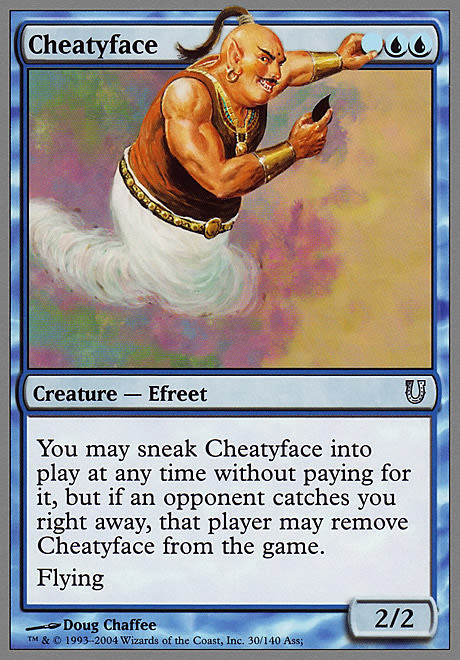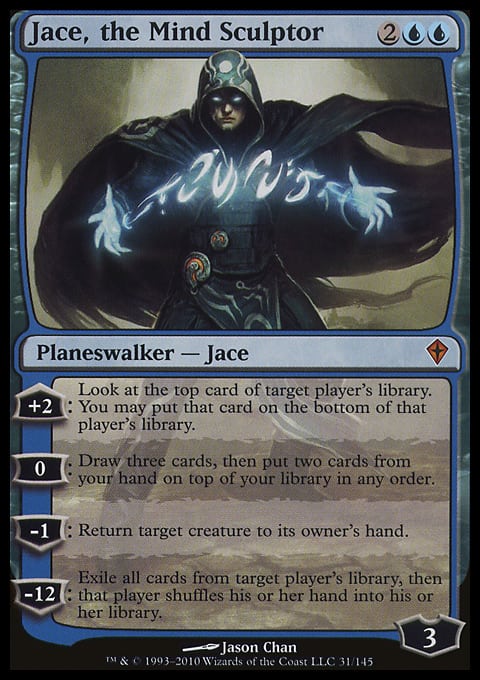An acquaintance of mine was recently disqualified from a Pro Tour Qualifier for cheating. Afterward, my Facebook feed was filled with discussion about the incident. Was he actually cheating or merely ignorant? Should he actually have been DQ’d or given a lesser punishment? Should he now be suspended? It was a reminder to me that, despite improved judging and anti-cheating vigilance, Magic certainly isn’t completely bereft of cheaters yet. The other thing that struck me was my reaction when I found out the player’s identity: a complete lack of surprise. When I asked myself why I wasn’t surprised, it wasn’t because of any specific innuendo or events that I’ve witnessed involving that player. It was because he fit a specific profile that I’ve come to associate with many cheaters over the years. This led to my next surprise: I hadn’t realized that I had developed any kind of personality profile for cheaters.
While being DQ’d for cheating isn’t proof positive that someone is a cheater, it’s certainly pretty suggestive. Setting aside whether the specific individual referred to above is truly a cheater, though, I want to take a closer look at the profile I’ve developed. Much to my surprise, there are currently over two hundred people suspended by the DCI. Of course, this is not a comprehensive list of cheaters either (in part because it’s possible to be suspended for other things). There are plenty of cheaters who have finished serving their suspensions and plenty more who have managed to avoid being suspended for one reason or another. The point is there are many, many cheaters, and, of course, they’re not all the same.
That doesn’t mean we can’t learn anything from personality profiles. Just ask the FBI and the legions of analysts they have profiling serial killers. Mike Long, Trey Van Cleave, Alex Bertoncini, Casey McCarrel, and Nick Eisel—what do these players have in common besides being some of the most famous cheaters in the history of the game?
For me, this internal profile started with Mike Long, in part because not only did I know him better than almost any cheater I’ve known about, but because I witnessed so much of his illegal and/or unsportsmanlike behavior firsthand. Discovering both that he was a cheater and to what extent was a major blow to me for two reasons:
- He was a personal friend. He was charming and friendly, and we worked together remotely to prepare for a couple major events.
- He didn’t fit any of my preconceived notions of what type of person I thought a cheater would be.
Not only did I come to realize what a chronic, “serial,” cheater Long was, but I came to realize that not only was his personality not contraindicative of being a cheater, but there are many aspects of his personality that seem to apply to many famous cheaters and cheaters whom I’ve had the misfortune of encountering for myself.
Skill
Like many of these characteristics, this one makes quite a bit of sense when you think about it. The surface analysis of cheating might say, “They cheat because they aren’t good enough to win without cheating.” Yet, it’s often quite the opposite. Players like Mike Long don’t make it all the way to the Top 8 of a Pro Tour merely by cheating. First of all, in order to overcome a major lack of skill to make it all the way to the Top 8 of a Pro Tour by cheating, it would mean cheating on such a massive scale in such a large quantity that high-level players and judges would inevitably catch you on the way. No, if you’re going to be a cheater at the highest level, you need to be good at Magic, too. Now, you can cheat more selectively and subtlety to help yourself advance and actually have a prayer of getting away with it.
Second, if you have the smarts and skills to be a really good cheater at Magic, it’s likely you have the smarts and skills to be a pretty good player also. Finally, many skilled cheaters cheat precisely because they believe themselves to be so good at Magic. They believe other players are scrubs who win through luck rather than skill. By cheating, players like Long believe they are merely ensuring the best player is winning by taking luck out of the equation.
Self-Delusion
Nobody views themselves as villains and bad people. This means there is a need for self-justification and self-brainwashing if someone is going to do “bad” things. In addition to believing they “deserve” to win because they’re better than their opponent, serial cheaters also believe that they’re simply maintaining a level playing field. After all, if saints like they are cheat, surely everyone does, right? After all, the reason they can’t seem to win Pro Tours without cheating can’t be simply about luck and skill, can it? Surely players with as much success as Kai Budde and Jon Finkel must be cheaters, right? So, since they can’t accept that they might be inferior to other players, they assume that by cheating they’re just doing what everyone else is doing.
Win at All Costs
Part of becoming a high-level player is having an extremely high desire to win. In the dog-eat-dog world of high-level competitive Magic, often, only the most intense and competitive personalities prosper. In the drive to win, there is a nonstop search for an edge. What’s the best deck? The best play? The best mind game? It starts with legitimate strategy, evolves to angle shooting, and, in some cases, leads to the even darker path of outright cheating.
Charm
While serial killers may be loners without much social skill—and that might even describe quite a few Magic players—many serial cheaters are quite the opposite. Over the years, I and many others have been subjected to one shock after another as cheaters have been revealed. “But he’s such a nice guy! He’s my friend! He seemed so cool; he was always so friendly!”
Serial cheaters are much more likely to be smooth-talking salesperson types than quiet and brooding. First of all, by being garrulous and friendly, it helps remove them from suspicion of being cheaters. After all, if someone is really nice to you on the surface, why would he or she be doing something so not nice to you as cheating against you? Also, a good conversation makes for a good distraction. Many of the principles of illusion apply to cheating at cards. If you don’t want your opponent paying attention to what you’re really doing, you need to give him or her something else to pay attention to. In addition, many cheaters may actually be legitimately nice guys away from the gaming table. In the self-deluded world of serial cheaters, the cheating they do doesn’t prevent them from acting like good people in other ways and even actually believing that they’re good people.
Risk and Reward
Morality aside, why don’t even more people cheat? Threat of punishment. There is a risk-and-reward proposition to cheating at Magic. By cheating, you increase your chances of victory and any rewards associated with winning. You also run the risk of being caught and revealed as a cheater. Not only can this lead to major penalties such as disqualification and suspension, but it can forever change how other people view you for the worse. Many serial Magic cheaters get started at a young age. It’s been scientifically proven that teenagers are drawn to risk and that adults are more risk-averse.
While this may help a young Magic player win a game by making a risky play that pays off, it can also lead to taking darker risks. Most likely, you’ve heard that young people consider themselves invincible—this leads them to do things with extreme potential consequences that might scare others away. Once a potential serial cheater has started successfully cheating, it’s easy for that to become a habit. Not only did the cheater get to experience the high associated with winning, he or she got to experience the high of getting away with cheating—a type of winning in itself. If he or she gets away with it once, why can’t he or she do it again? Like any type of high, these behaviors can become psychologically addictive.
The Reality
Being a serial cheater says many dark things about a player. First, it’s incredibly selfish. By cheating, the cheater takes away the success that other players should be legitimately earning with just their skills and not by cheating. Like a drug addict stealing from and hurting people close to him or her in order to support the habit, the serial cheater just cares about getting what he or she wants and not about whom he or she is hurting. It also can reveal a great weakness of mental and emotional fortitude. Part of being a serious Magic player is losing—even losing to lesser players who get lucky. Serial cheaters often find this experience so painful that they’d rather cheat than go through it.
It’s unlikely that cheating will ever be completely removed from any competitive sport or activity, not just Magic. Yet, we can stay vigilant for it and do our best to ensure that those who do cheat aren’t able to continue doing it and continue enjoying the spoils of their nefarious efforts. I hope in your reading this I haven’t led you to believe there is only one type of cheater. Rather, I hope you’ll realize that the fact that someone doesn’t “seem like a cheater” doesn’t mean he or she isn’t.


























